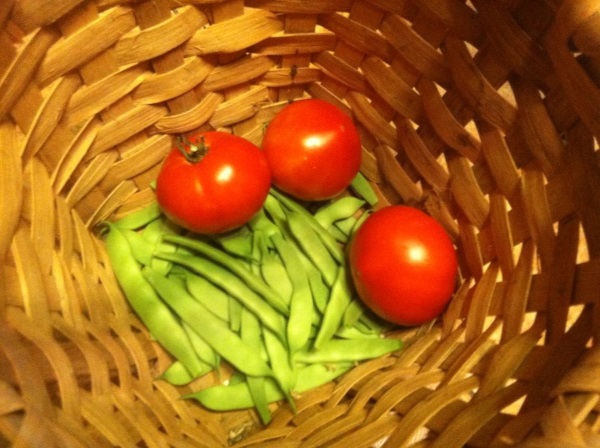by Malinda Dunlap Fillingim
It’s a shame I have such clean hands. I really miss them being dirty, real dirty, so dirty I have to wash them with the garden hose even before going inside to wash them again and again until my fingernails are discovered under layers of dirt.
Dirty hands came easily as a child working outside with my grandmother in her garden. With the Sauratown Mountains watching our efforts we felt blessed with good Piedmont soil, rich and ready to bring seeds to life. We were environmentally green before it was the cool thing to be, organic without even knowing it. While our neighbors worked in the cash crop of the tobacco fields, we hoed our gardens in a row, from the fence post to the edge of an old shed. We prepared the soil like we were readying our house for an honored guest; pushing away the top soil and making room for the new life we planted seed by saved send from the cream of the last year’s crop. We cultivated our garden way before Voltaire entered our library shelves.
Gardening wasn’t our hobby. No, gardening was our survival, our form of making sure we had enough good things for our family, and a few others, to eat. Some might say we were poor, but looking back I realize how rich we were. We had land to farm, the sky as our ceiling, the earth as our provider and time to spend together discussing all things a little girl ponders while hoeing with her beloved grandmother. It was not an easy task, this gardening, but it wasn’t a task either; it was a lesson plan on life.
In my grandmother’s garden, I learned that things needed one another to grow. A lone corn stalk wouldn’t mature or develop as it should. No, it needed other stalks to stand with it to grow tall. I learned that tilling the soil and preparing it with the right fertilizers (manure, fish heads, and ashes) was very important, and taking the proper measures of preparing my foundation would help ensure a good crop. “Haste makes waste,” my grandmother said as I begged to skip all the preliminary work before dropping seeds.
My grandmother told me that each vegetable, like each child, needed different things to grow. The beans needed vines to cling to as they grew upwards. Tomatoes needed cages to protect them and to give them strength to grow. Our squash liked mounds so they could gently stretch out as they matured. She talked of her garden as if they were first cousins, close and familiar.
Weeding was constant; always keeping an eye out for anything that might choke the life out of a vegetable and ridding our garden of weeds that killed. “You might think it alright to leave one weed, but one weed might lead you to two weeds and soon you got nothing but weeds to eat.”
Some root vegetables, like onions and potatoes, had to be gently prodded out, lest we ruin the texture or bruise the edible part. “Some people don’t know how to be welcomed, so be gentle with them just like you would this here onion, pulling with just the right force.”
When the hot summer failed to provide enough rain water for our garden, my grandmother never worried. She had saved rain water in barrels during heavy storms. We let the saved up rain water nourish out garden gently, not wanting to overwhelm it.
Harvest time taught me much about the right timing for all things good. “Don’t pick with your stomach, pick with your head. You’ll know when a vegetable is ready for picking and when it needs more time.” I was in a hurry to pick and eat the evidence of my hard work, but she taught me that like life, all things have a season, a time for planting, growing, and picking. I waited until she gave the go ahead and then I harvested feeling a sense of pride and accomplishment.
Each time we put away a batch of tomato sauce, a jar of beans, a freezer bag of green beans, I stood taller than a corn stalk. She helped me give birth to the vegetables, to that which fed me and helped make me strong, all in a garden of love.
It’s a shame most children’s hands don’t get dirty in a garden. If they did, I think they’d appreciate their food more, enjoy the company of the earth, and begin to realize how being outside under a blue sky helps grow you up to far more than you can imagine becoming.
Now, when I go to a farmer’s market near my home in Southport, or in downtown Wilmington, I think of my grandmother. Her garden was her classroom, teaching me to appreciate the food my labor helped to produce, to have a strong work ethic, and to respect all the ways the earth feeds us.
___________________________________________________________
 Malinda Dunlap Fillingim had the good fortune to move to her step-father’s hometown, Walnut Cove, NC when she was in eighth grade. Curious by nature, Malinda asked Mama Dunlap so many questions about her cooking that she finally gave up some of the old recipes she carried in her head. Malinda is an ESL teacher at Cape Fear Community College and lives in Leland with her husband.
Malinda Dunlap Fillingim had the good fortune to move to her step-father’s hometown, Walnut Cove, NC when she was in eighth grade. Curious by nature, Malinda asked Mama Dunlap so many questions about her cooking that she finally gave up some of the old recipes she carried in her head. Malinda is an ESL teacher at Cape Fear Community College and lives in Leland with her husband.


Leave a Reply